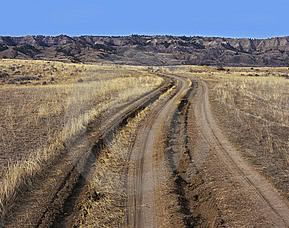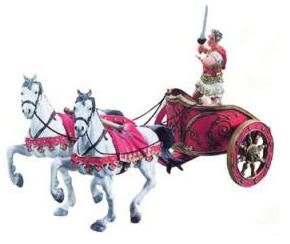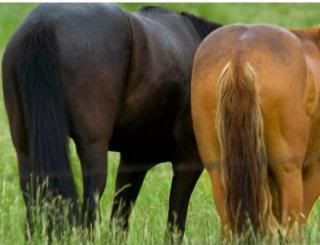Railroad tracks.

The US standard railroad gauge (distance between the rails) is 4 feet, 8.5 inches. That's an exceedingly odd number.
Why was that gauge used? Because that's the way they built them in England , and English expatriates designed the US railroads.
Why did the English build them like that? Because the first rail lines were built by the same people who built the pre-railroad tramways, and that's the gauge they used.
Why did 'they' use that gauge then? Because the people who built the tramways used the same jigs and tools that they had used for building wagons, which used that wheel spacing.

Why did the wagons have that particular odd wheel spacing? Well, if they tried to use any other spacing, the wagon wheels would break on some of the old, long distance roads in England , because that's the spacing of the wheel ruts.

So who built those old rutted roads? Imperial Rome built the first long distance roads in Europe (including England ) for their legions. Those roads have been used ever since.
And the ruts in the roads? Roman war chariots formed the initial ruts, which everyone else had to match for fear of destroying their wagon wheels.
Since the chariots were made for Imperial Rome, they were all alike in the matter of wheel spacing. Therefore the United States standard railroad gauge of 4 feet, 8.5 inches is derived from the original specifications for an Imperial Roman war chariot. Bureaucracies live forever.

So the next time you are handed a specification/procedure/process and wonder 'What horse's ass came up with this?' , you may be exactly right. Imperial Roman army chariots were made just wide enough to accommodate the rear ends of two war horses. (Two horses' asses.)

Now, the twist to the story:
When you see a Space Shuttle sitting on its launch pad, there are two big booster rockets attached to the sides of the main fuel tank. These are solid rocket boosters, or SRBs. The SRBs are made by Thiokol at their factory in Utah.

The engineers who designed the SRBs would have preferred to make them a bit fatter, but the SRBs had to be shipped by train from the factory to the launch site. The railroad line from the factory happens to run through a tunnel in the mountains, and the SRBs had to fit through that tunnel. The tunnel is slightly wider than the railroad track, and the railroad track, as you now know, is about as wide as two horses' behinds.

So, a major Space Shuttle design feature of what is arguably the world's most advanced transportation system was determined over two thousand years ago by the width of a horse's ass. And you thought being a horse's ass wasn't important? Ancient horse's asses control almost everything... and
CURRENT Horses Asses in Washington are controlling everything else.









9 comments:
Dang, that was interesting and funny.
O MY I love this one!
Who would have thought a horse's derriere would have so much control over world events.
This post is an A++, no deductions for use of that A word. How do you manage to collect such gems?
That is a really interesting post!
Quite amazing really. No wonder people keep saying "Think outside of the box".
Pretty funny! And notice, Ann used the word "derriere!" Hahaha.
Have a good evening, Patty.
Now this is a mouth full and you are right about Washington, very interesting.
How interesting--there are places in Eastern Oregon where you can still see those wagon rutted roads where the wagon trains came through.
It is amazing they've lasted so long.
I really loved this post.
See Patty, you not only bring smiles to our faces - but you educate us as well! Thanks for the little history lesson this morning. :-)
enjoy your weekend!
Cindy
Post a Comment